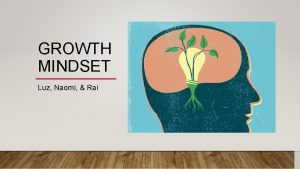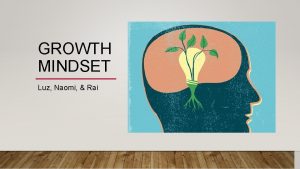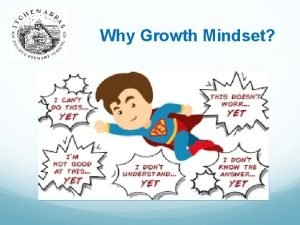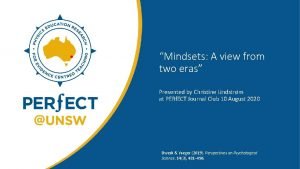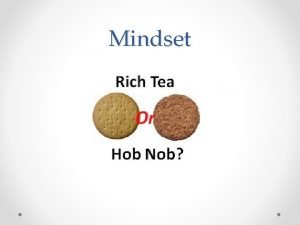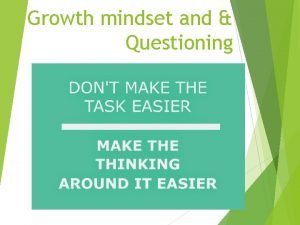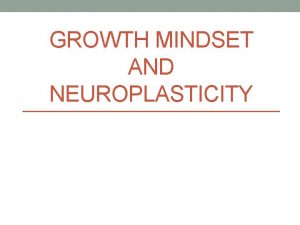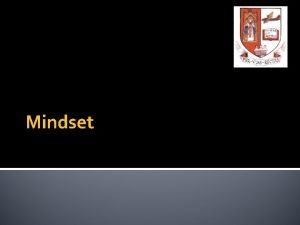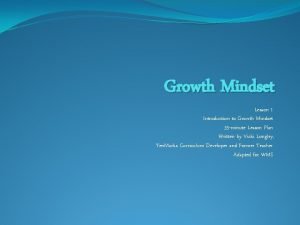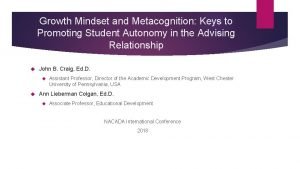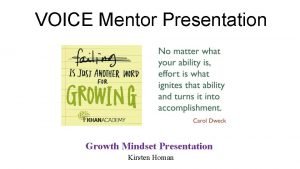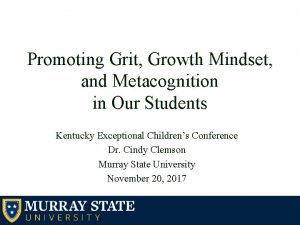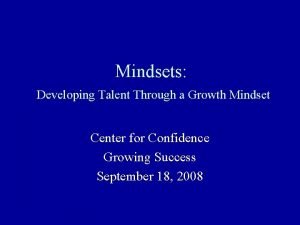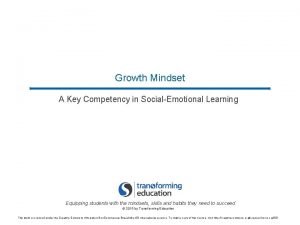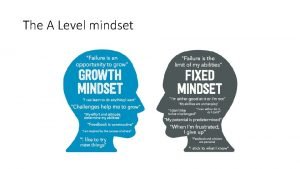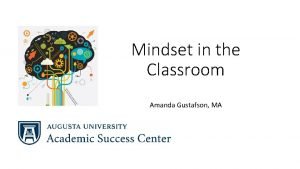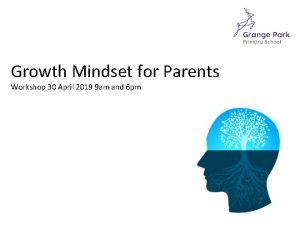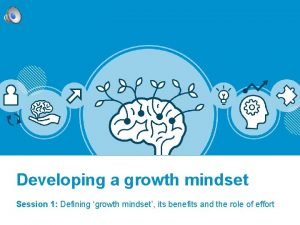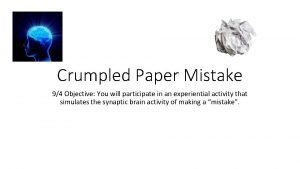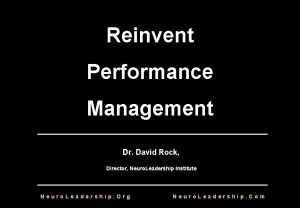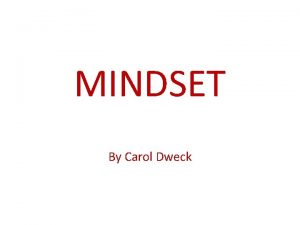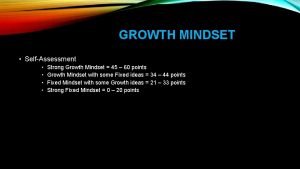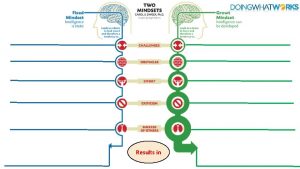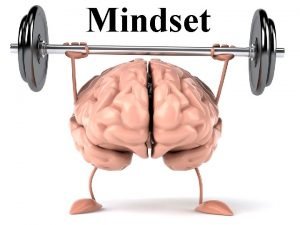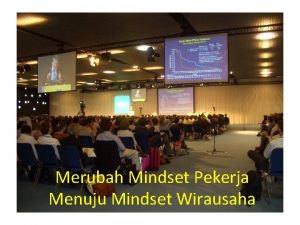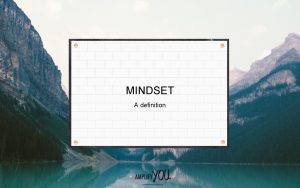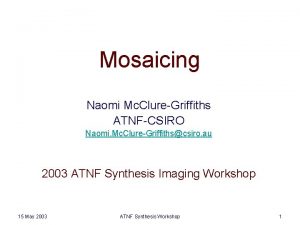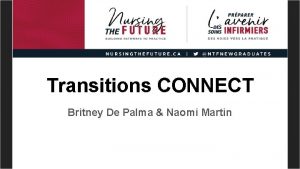GROWTH MINDSET Luz Naomi Rai MINDSET Research was





















- Slides: 21

GROWTH MINDSET Luz, Naomi, & Rai

MINDSET • Research was done by Carol Dweck. • Fixed mindset- People believe their basic qualities are simply fixed traits. They also believe talent alone creates success. • Growth mindset- People believe that their most basic abilities can be developed through dedication and hard work.

Two Mindsets in the Classroom • Fixed mindset students focused on grades. • Growth mindset students focused more on learning than getting good grades.

Fixed Mindset vs Growth Mindset https: //www. youtube. com/watch? v=KUWn_TJTrn. U

WHY IS GROWTH MINDSET IMPORTANT? • A simple belief that intelligence is malleable can better equip children for challenging tasks and difficult subject matter. • Helping students realize that they can succeed through effort and dedication can create love for learning.

QUESTION: • THINK OF A TIME WHEN YOU ACCOMPLISHED SOMETHING THAT YOU THOUGHT YOU WOULD HAVE NEVER ACCOMPLISHED. • How did you feel when you struggled? • What motivated you to keep pushing?

PROMOTE GROWTH MINDSET • Celebrate small victories • Praise their efforts and strategies • Help students focus on and value the process of learning • Activities that involves collaboration

PROMOTE GROWTH MINDSET https: //www. youtube. com/watch? v=a. NHas 97 i. E 78

Mindset Thinking What do you say to yourself when things get hard? When you’re stuck and want to quit? What do you say to your kids when things get hard? When they’re stuck and want to quit?

Model Growth Mindset

Model Growth Mindset

EXAMPLE OF GROWTH MINDSET IN EVERYDAY LIFE • Feedback: • Fixed Mindset: Teachers/students would often beat themselves up and think/feel that they are not good enough to do the job. • Growth Mindset: Teachers/students would use the feedback to reflect and improve their performance.

The Power of YET

Those using Growth Mindset say: “We had no idea that it could have such a powerful impact. It may that these most important discoveries about the human brain will revolutionize the way we think about motivating students and empowering educators” - Bill Morones, High School Principal

- Common Misconception #1 - To foster a growth mindset, simply praise children for working hard - A body of research has shown that telling children that they’re smart and implying that their success depends on it fosters fixed mindsets. When these children later experience struggle, they tend to conclude that their ability is not high after all, and as a result they lose confidence, so our praise has the opposite effect of what we intended. Praising hard work or strategies used, things that children control, has been shown to support a growth mindset.

Common Misconception #2 Growth mindset is about changing young people, not adults - Encourage the adults to start with themselves. If we don’t work to shift our own mindset about ourselves and our students, then we won’t work to change many other important things in the system necessary to improve education. - If the adults teaching growth mindset don’t take on the growth mindset ideal, the efforts to foster growth mindsets in students are likely to fail because we will say and do things that reflect our fixed mindset beliefs, which students will notice. - Authentically working to become better at what we do throughout our lives, including how we teach and how we create contexts that help students thrive, and making our learning process visible to one another and to students.

- Common Misconception #3 Another confusion about mindset is that the only determinant of success is our mindset. But that’s not the case. Context, culture, environment, and systems matter. For one thing, people’s mindsets (as well as All that matters is what is in the mind. other beliefs and behaviors) are strongly shaped by the people around them.

- Carol Dweck has talked extensively about changing learning tasks, testing practices, and grading systems. Too Common Misconception #4 Improvement is all about changing beliefs and not doing anything else many tasks and teaching approaches are superficial, irrelevant, unengaging, and not learner-centered. We do need to change these tasks, the curriculum, and the pedagogy. We need to change the idea that school is about testing rather than about learning.

- - False Growth Mindset According to Dweck: - False growth mindset is saying you have growth mindset when you don't really have it or you don’t really understand [what it is]. It’s also false in the sense that nobody has a growth mindset in everything all the time. Everyone is a mixture of fixed and growth mindsets. You could have a predominant growth mindset in an area but there can still be things that trigger you into a fixed mindset trait. Something really challenging and outside your comfort zone can trigger it, or, if you encounter someone who is much better than you at something you pride yourself on, you can think “Oh, that person has ability, not me. ” So I think we all, students and adults, have to look for our fixedmindset triggers and understand when we are falling into that mindset. I think a lot of what happened [with false growth mindset among educators] is that instead of taking this long and difficult journey, where you work on understanding your triggers, working with them, and over time being able to stay in a growth mindset more and more, many educators just said, “Oh yeah, I have a growth mindset” because either they know it’s the right mindset to have or they understood it in a way that made it seem easy.

Resources to Promote Growth Mindset https: //www. edutopia. org/article/growth-mindset-resources

Test your Mindset https: //mindsetonline. com/testyourmindset/step 1. php
 Naomi rai
Naomi rai Naomi rai
Naomi rai Matthew syed growth mindset
Matthew syed growth mindset False growth mindset
False growth mindset Growth mindset values
Growth mindset values Is growth mindset a theory
Is growth mindset a theory Growth mindset multiple choice questions
Growth mindset multiple choice questions Growth mindset assessment
Growth mindset assessment 10 growth mindset statements
10 growth mindset statements Introduction to growth mindset
Introduction to growth mindset Metacognition and growth mindset
Metacognition and growth mindset Growth mindset presentation
Growth mindset presentation Metacognition and growth mindset supports grit.
Metacognition and growth mindset supports grit. Growth mindset cartoon
Growth mindset cartoon Growth mindset competency
Growth mindset competency Vespa mindset resources
Vespa mindset resources Growth mindset definition
Growth mindset definition Nigel holmes growth mindset
Nigel holmes growth mindset Growth mindset definition
Growth mindset definition Growth mindset definition
Growth mindset definition How to uncrumple paper
How to uncrumple paper David rock feedback
David rock feedback
